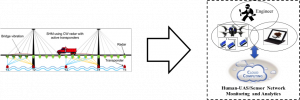The recent decade has witnessed that many nations including the US have experienced extreme geological and climatic events, resulting in loss of life, injuries, extensive infrastructure and community damage, and interruption of economic services. We conduct research towards realizing the general notion of ‘resilience’ with a focus in studying the multi-hazard extreme-loading impacts on soil-foundation-structure and other infrastructure performance. Our main efforts include:
- Multi-hazard soil-foundation-structure (SFS) modeling and performance evaluation
- Physical modeling (centrifuge/flume-based) of SFS structures and infrastructure
- Robotic aerial-ground sensing network for intelligent health monitoring and condition assessment
Research Projects
(1) Life-cycle Multi-hazard Assessment of Scoured Bridge Structures (funded by UMRB 2011 ~2013).
One major product of this research program is the LIFE-Sim software, which is powered by Matlab-based post-processing and OpenSEE-based finite-element simulation. The software package (LIFE-SA and its reduced version PBSS-Bridge) is being organized and will be realized officially soon.
- LIFE-SA: LIfe-cycle Probabilistic Multi-hazard Flood-Scour and Earthquake Simulation and Assessment for Bridge Structures
- PBSS-Bridge: Performance-based Seismic and Scour Assessment for River-Crossing Bridges
(2) Resilient Aerial Imaging and Ground Sensing Net (RAIGS-net) (ongoing)
A ongoing research project with an ultimate goal of integrating aerial imaging, multi-view remote sensing, and real-time diagnosis.
 (3) UMKC Green Infrastructure Assessment
(3) UMKC Green Infrastructure Assessment
An ongoing pilot project focusing on automating rain garden assessment using mobile-cloud computing technologies and big-data enabled rain garden performance computing.
